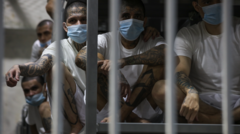El Salvador's President Nayib Bukele has made headlines by proposing a humanitarian agreement that involves repatriating 252 Venezuelans deported from the United States, in exchange for the release of the same number of political prisoners held by Venezuelan authorities. Bukele addressed the appeal directly to Venezuelan President Nicolás Maduro through a post on social media, outlining his position on the matter.
In his statement, Bukele emphasized that many of the Venezuelans deported to El Salvador had been convicted of serious crimes, including "rape and murder," contrasting their cases with Venezuelan political prisoners whom he described as individuals jailed simply for opposing Maduro's government. The controversy surrounding this proposition intensified when Venezuela's chief prosecutor, Tarek William Saab, criticized the offer, querying the legal status of the deported individuals, including their access to due process and formal charges.
Venezuela’s government maintains that it does not hold political prisoners, a viewpoint widely contested by various human rights organizations. Bukele’s post raised eyebrows as he proposed that, along with the deported Venezuelans, almost 50 individuals of other nationalities—including American citizens—should be considered in the proposed swap.
Recently, over 200 Venezuelans have been deported from the US to El Salvador, with many described by former President Trump as members of the Tren de Aragua gang, prompting financial support from Washington to manage these individuals within El Salvador's high-security facilities. Bukele, who has previously referred to himself as "the world's coolest dictator," has garnered significant popularity through his aggressive anti-gang approach while also facing scrutiny and criticism for his governance styles.
In the geopolitical landscape, Maduro condemned the US’s actions regarding deportations as "kidnapping," and a violation of human rights. Furthermore, amidst ongoing debates regarding the legality of US deportation policies, a recent ruling from the US Supreme Court ordered a pause on deporting other individuals labeled as members of Venezuelan gangs, illustrating the contentious nature of immigration policies and their implications on international diplomacy and human rights.
In his statement, Bukele emphasized that many of the Venezuelans deported to El Salvador had been convicted of serious crimes, including "rape and murder," contrasting their cases with Venezuelan political prisoners whom he described as individuals jailed simply for opposing Maduro's government. The controversy surrounding this proposition intensified when Venezuela's chief prosecutor, Tarek William Saab, criticized the offer, querying the legal status of the deported individuals, including their access to due process and formal charges.
Venezuela’s government maintains that it does not hold political prisoners, a viewpoint widely contested by various human rights organizations. Bukele’s post raised eyebrows as he proposed that, along with the deported Venezuelans, almost 50 individuals of other nationalities—including American citizens—should be considered in the proposed swap.
Recently, over 200 Venezuelans have been deported from the US to El Salvador, with many described by former President Trump as members of the Tren de Aragua gang, prompting financial support from Washington to manage these individuals within El Salvador's high-security facilities. Bukele, who has previously referred to himself as "the world's coolest dictator," has garnered significant popularity through his aggressive anti-gang approach while also facing scrutiny and criticism for his governance styles.
In the geopolitical landscape, Maduro condemned the US’s actions regarding deportations as "kidnapping," and a violation of human rights. Furthermore, amidst ongoing debates regarding the legality of US deportation policies, a recent ruling from the US Supreme Court ordered a pause on deporting other individuals labeled as members of Venezuelan gangs, illustrating the contentious nature of immigration policies and their implications on international diplomacy and human rights.

















